| Listing 1 - 10 of 21 | << page >> |
Sort by
|
Book
ISBN: 9781684580262 1684580269 9781684580279 1684580277 Year: 2020 Publisher: Waltham Brandeis University Press
Abstract | Keywords | Export | Availability | Bookmark
 Loading...
Loading...Choose an application
- Reference Manager
- EndNote
- RefWorks (Direct export to RefWorks)
"Contemporary discussions of China tend to focus on politics and economics, giving Chinese culture little if any attention. Why Fiction Matters in Contemporary China offers a corrective, revealing the crucial role that fiction plays in helping contemporary Chinese citizens understand themselves and their nation. Where history fails to address the consequences of man-made and natural atrocities, David Der-wei Wang argues, fiction arises to bear witness to the immemorial and unforeseeable. Beginning by examining President Xi Jinping's call in 2013 to "tell the good China story," Wang illuminates how contemporary Chinese cultural politics have taken a "fictional turn," which can trace its genealogy to early modern times. He does so by addressing a series of discourses by critics within China, including Liang Qichao, Lu Xun, and Shen Congwen, as well as critics from the West such as Arendt, Benjamin, and Deleuze. Wang highlights the variety and vitality of fictional works from China as well as the larger Sinophone world, ranging from science fiction to political allegory, erotic escapade to utopia and dystopia. The result is an insightful account of contemporary China, one that affords countless new insights and avenues for understanding"--
Chinese fiction --- Literature and society --- History and criticism --- History
Book
ISBN: 9780674967915 Year: 2017 Publisher: Cambridge The Belknap Press of Harvard University Press
Abstract | Keywords | Export | Availability | Bookmark
 Loading...
Loading...Choose an application
- Reference Manager
- EndNote
- RefWorks (Direct export to RefWorks)
A New Literary History of Modern China is a collective project that introduces the "long" modern period of Chinese literature from the late seventeenth century to the new millennium. The volume, with roughly 160 essays contributed by 145 authors on a wide spectrum of topics, is intended for readers who are interested in understanding modern China through its literary and cultural dynamics. At the same time, it takes up the challenge of rethinking the conceptual framework and pedagogical assumptions that underlie the extant paradigm of writing and reading literary history. Beyond the familiar canon of literature as representation, the volume seeks to include the tradition of literature as manifestation, on both textual and contextual levels, in a history of modern Chinese literature. In addition to familiar genres, A New Literary History features a diverse lineup of forms, from presidential speeches to pop song lyrics, from photographs to films, and from political treatises to prison house jottings--forms that not only represent the material world, but can also shape it and complete it. By combining both the pointillism of the chronicle and the comprehensiveness of grand recit, this revisionist endeavor introduces the four themes of "worlding" literary China: architectonics of temporalities; dynamics of travel and transculturation; contestation between wen and mediality; and remapping of the literary cartography of modern China.--
Chinese literature --- Literature and society --- History and criticism --- History
Multi
ISBN: 9780231538572 9780231170468 023153857X 0231170467 Year: 2015 Publisher: New York, N.Y. Columbia University Press
Abstract | Keywords | Export | Availability | Bookmark
 Loading...
Loading...Choose an application
- Reference Manager
- EndNote
- RefWorks (Direct export to RefWorks)
Book
Abstract | Keywords | Export | Availability | Bookmark
 Loading...
Loading...Choose an application
- Reference Manager
- EndNote
- RefWorks (Direct export to RefWorks)
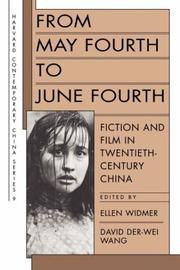
ISBN: 0674045165 9780674045163 9780674325029 067432501X 0674325028 9780674325012 Year: 2009 Publisher: Cambridge, MA
Abstract | Keywords | Export | Availability | Bookmark
 Loading...
Loading...Choose an application
- Reference Manager
- EndNote
- RefWorks (Direct export to RefWorks)
What do the Chinese literature and film inspired by the Cultural Revolution (1966-1976) have in common with the Chinese literature and film of the May Fourth movement (1918-1930)? This new book demonstrates that these two periods of the highest literary and cinematic creativity in twentieth-century China share several aims: to liberate these narrative arts from previous aesthetic orthodoxies, to draw on foreign sources for inspiration, and to free individuals from social conformity. Although these consistencies seem readily apparent, with a sharper focus the distinguished contributors to this volume reveal that in many ways discontinuity, not continuity, prevails. Their analysis illuminates the powerful meeting place of language, imagery, and narrative with politics, history, and ideology in twentieth-century China. Drawing on a wide range of methodologies, from formal analysis to feminist criticism, from deconstruction to cultural critique, the authors demonstrate that the scholarship of modern Chinese literature and film has become integral to contemporary critical discourse. They respond to Eurocentric theories, but their ultimate concern is literature and film in China's unique historical context. The volume illustrates three general issues preoccupying this century's scholars: the conflict of the rural search for roots and the native soil movement versus the new strains of urban exoticism; the diacritics of voice, narrative mode, and intertextuality; and the reintroduction of issues surrounding gender and subjectivity. Table of Contents: Preface Acknowledgments Introduction David Der-wei Wang part:1 Country and City 1. Visitation of the Past in Han Shaogong's Post-1985 Fiction Joseph S. M. Lau 2. Past, Present, and Future in Mo Yan's Fiction of the 1980s Michael S. Duke 3. Shen Congwen's Legacy in Chinese Literature of the 1980s Jeffrey C. Kinkley 4. Imaginary Nostalgia: Shen Congwen, Song Zelai, Mo Yan, and Li Yongping David Der-wei Wang 5. Urban Exoticism in Modern and Contemporary Chinese Literature Heinrich Fruehauf part: 2 Subjectivity and Gender 6. Text, Intertext, and the Representation of the Writing Self in Lu Yun, Dafu,and Wang Meng Yi-tsi Mei Feuerwerker 7. Invention and Intervention: The Making of a Female Tradition in Modern Chinese Literature Lydia H. Liu 8. Living in Sin: From May Fourth via the Antirightist Movement to the Present Margaret H. Decker part: 3 Narrative Voice and Cinematic Vision 9. Lu Xun's Facetious Muse: The Creative Imperative in Modern Chinese Fiction Marston Anderson 10. Lives in Profile: On the Authorial Voice in Modern and Contemporary Chinese Literature Theodore Huters 11. Melodramatic Representation and the "May Fourth" Tradition of Chinese Cinema Paul G. Pickowicz 12. Male Narcissism and National Culture: Subjectivity in Chen Kaige's King of the Children Rey Chow Afterword: Reflections on Change and Continuity in Modern Chinese Fiction Leo Ou-fan Lee Notes Contributors From May Fourth to June Fourth will he warmly welcomed. It should be of great interest to all concerned with literary developments in the contemporary world on the one hand, and on the other with the enigmas surrounding China's alternating attempts to develop and to destroy herself as a civilization.--Cyril Birch, University of California, Berkeley
Chinese literature --- Motion pictures --- History and criticism. --- History. --- S17/2000 --- History and criticism --- History --- China: Art and archaeology--Film
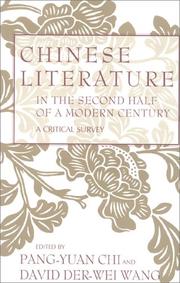
ISBN: 0253337100 0253108365 Year: 2000 Publisher: Bloomington Indiana university press
Abstract | Keywords | Export | Availability | Bookmark
 Loading...
Loading...Choose an application
- Reference Manager
- EndNote
- RefWorks (Direct export to RefWorks)
S16/0170 --- S26/0450 --- S27/0450 --- S16/0190 --- S16/0195 --- S16/0100 --- Chinese literature --- -China: Literature and theatrical art--General works on modern literature --- Taiwan--Literature --- Hong Kong--Literature --- China: Literature and theatrical art--Literary criticism --- China: Literature and theatrical art--Thematic studies --- China: Literature and theatrical art--Bibliographies, dictionaries, yearbooks and collections --- History and criticism --- -History and criticism
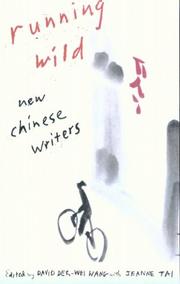
ISBN: 0231096488 0231096496 Year: 1994 Publisher: New York (N.Y.): Columbia university press
Abstract | Keywords | Export | Availability | Bookmark
 Loading...
Loading...Choose an application
- Reference Manager
- EndNote
- RefWorks (Direct export to RefWorks)
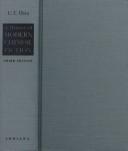
ISBN: 0253334772 Year: 1999 Publisher: New Haven (Conn.): Yale university
Abstract | Keywords | Export | Availability | Bookmark
 Loading...
Loading...Choose an application
- Reference Manager
- EndNote
- RefWorks (Direct export to RefWorks)
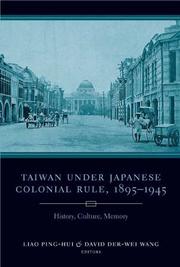
ISBN: 0231137982 0231510810 Year: 2006 Publisher: New York Columbia university press
Abstract | Keywords | Export | Availability | Bookmark
 Loading...
Loading...Choose an application
- Reference Manager
- EndNote
- RefWorks (Direct export to RefWorks)
Taiwan --- Civilization --- Japanese influences.
Book
ISBN: 9789882200845 9789888528363 988852836X Year: 2020 Publisher: Hong Kong: Hong Kong University Press,
Abstract | Keywords | Export | Availability | Bookmark
 Loading...
Loading...Choose an application
- Reference Manager
- EndNote
- RefWorks (Direct export to RefWorks)
Utopia and Utopianism in the Contemporary Chinese Context: Texts, Ideas, Spaces decisively demonstrates the extent to which utopianism has shaped political thought, cultural imaginaries, and social engagement after it was introduced into the Chinese context in the nineteenth century. In fact, pursuit of utopia has often led to action—such as the Chinese Revolution and the Umbrella Movement—and contested consequences. Covering a time span that goes from the late Qing to our days, the authors show that few ideas have been as influencing as utopia, which has compellingly shaped the imaginaries that underpin China’s historical change. Utopianism contributed to the formation of the Chinese state itself—shaping the thought of key figures of the late Qing and early Republican eras such as Kang Youwei and Sun Yat-sen—and outlived the labyrinthine debates of the second half of the twentieth century, both under Mao’s rule and during the post-socialist era. Even in the current times of dystopian narratives, a period in which utopia seems to be less influential than in the past, its manifestations persistently provide lifelines against fatalism or cynicism. This collection shows how profoundly utopian ideas have nurtured both the thought of crucial figures during these historical times, the new generation of mainland Chinese and Sinophone intellectuals, and the hopes of twenty-first-century Hong Kong activists.
S02/0210 --- S06/0255 --- S12/0216 --- China: General works--Intellectuals: general and before 1840 --- China: Politics and government--Political theory: modern (and/or under Western influence) --- China: Philosophy and Classics--Political philosophy --- E-books --- Utopies --- Histoire --- Utopias --- China --- History.
| Listing 1 - 10 of 21 | << page >> |
Sort by
|

 Search
Search Feedback
Feedback About UniCat
About UniCat  Help
Help News
News